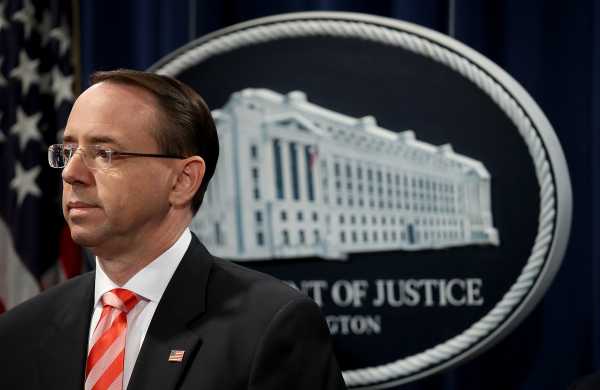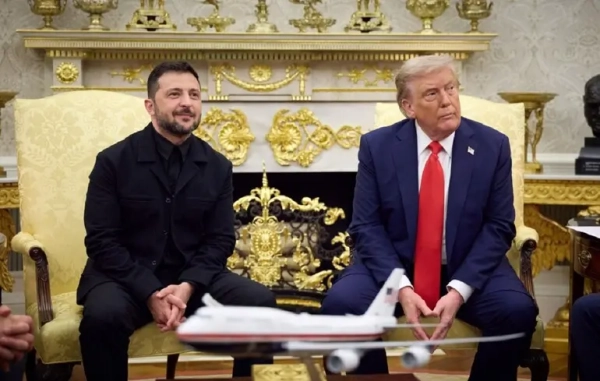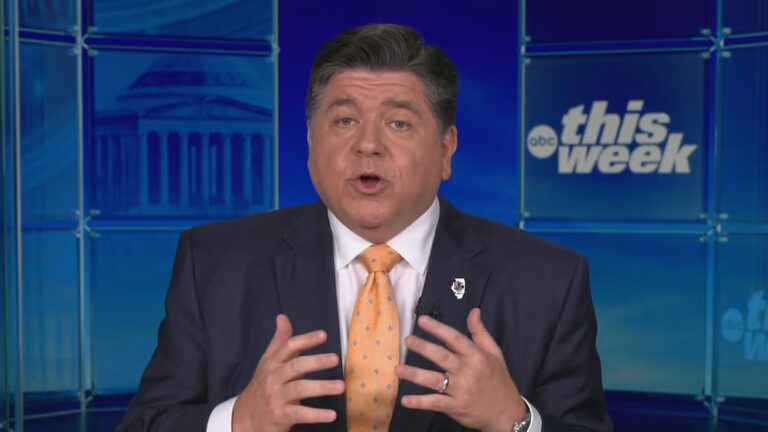
Correction and update: A previous version of this article said Rosenstein was out, citing reports from other news outlets. The article is now being updated as news develops.
It looks like Deputy Attorney General Rod Rosenstein will stay in his post until at least Thursday, when he’s set to meet with President Donald Trump.
Monday was a wild day in Washington, as different news reports gave rise to speculation that Rosenstein had resigned or even been fired. It started when Axios reported on Monday morning that Rosenstein offered to resign in a conversation with White House Chief of Staff John Kelly. Others, like the Washington Post and CNN, reported the same.
But then conflicting reports surfaced, with ABC and others saying Rosenstein expected to be fired during a Monday meeting at the White House. That led to widespread confusion about what, exactly, Rosenstein’s fate would be.
Later in the day, it became clear that Rosenstein was at the White House for a scheduled meeting and had spoken with the president on the phone. They agreed to meet in three days when Trump comes back from a high-stakes diplomatic gathering at the UN.
The conflicting news comes three days after the New York Times reported that the deputy attorney general said he wanted to record conversations with Trump last year and discussed using the 25th Amendment to remove the president from office. Rosenstein denied the report, and one source told the Times that Rosenstein had merely been joking.
But if Rosenstein were on the way out, it would be highly significant news.
Rosenstein is the man responsible for overseeing Mueller’s investigation into possible collusion between the Trump campaign and the Russian government during the 2016 US presidential election. That’s because Attorney General Jeff Sessions, Rosenstein’s boss, recused himself from the probe after it became clear he’d provided false and misleading testimony to Congress about his own contacts with Russia.
Rosenstein has therefore spent more than a year walking a delicate tightrope.
On one hand, he’s committed to protecting the investigation from conservatives inside and outside Congress who believed it’s biased against the president and had urged Trump to fire the special counsel. But Rosenstein couldn’t champion the investigation too much or he’d draw Trump’s ire.
Rosenstein’s possible departure would strike at the heart of the Trump-Russia investigation because Mueller has to run major investigative decisions past the deputy attorney general. Solicitor General Noel Francisco, who would replace Rosenstein if he left, could simply refuse to approve Mueller’s requests. That would slow the whole investigation to a crawl — or lead to Mueller’s ouster if he felt there was a reason to do so.
Rosenstein had refused to do that. He instead allowed Mueller’s probe to proceed unimpeded, while Mueller indicted top members of Trump’s campaign, including former campaign chair Paul Manafort, on tax, financial, and bank fraud charges. Manafort later pleaded guilty to one count of conspiracy against the US and one count of conspiracy to obstruct justice and is now cooperating with the Mueller investigation.
The future of the Mueller probe, and possibly even Trump’s presidency, depends on how well Rosenstein performed his delicate balancing act.
Rosenstein has to keep Trump and the Justice Department happy. That’s not easy.
Rosenstein’s performance during a congressional hearing last December showed how he has had to navigate the difficult situation he’s in.
Here’s what happened: On the night of December 12, mere hours before Rosenstein would testify at a House Judiciary Committee hearing, the Justice Department showed reporters some anti-Trump texts. The messages were from two FBI officials, Peter Strzok and Lisa Page, who had corresponded throughout the 2016 presidential election.
Strzok, a former top FBI counterintelligence official who was on Mueller’s investigative team, texted Page that Trump was an “idiot.” He also wanted Clinton to defeat Trump in the election — in another message, he wrote: “God Hillary should win 100,000,000 — 0.”
There was also a text that seemingly implied Strzok and Page were working on an “insurance policy” in case Trump won the election. But the Wall Street Journal reported on December 18 that Strzok’s text was really about the need to investigate possible Trump-Russia ties. Mueller removed Strzok from his staff last July, and the Strzok-Page exchanges remain subject to an internal investigation by the Justice Department. Still, some conservatives in and out of government think these texts show that the Mueller probe was working against the president.
It’s unclear if Rosenstein authorized the release of the texts, but some legal analysts thought the DOJ made the messages public the night before Rosenstein’s big hearing to curry favor with the anti-Mueller crowd on the House Judiciary Committee.
“It’s appalling behavior by the department,” Matthew Miller, a spokesperson for the Justice Department in the Obama administration, told Business Insider about the release of the texts at the time. “This is an ongoing investigation in which these employees have due-process rights, and the political leadership at DOJ has thrown them to the wolves so Rosenstein can get credit from House Republicans at his hearing.”
Rosenstein defended the release of the texts during the hearing, saying, “We consulted with the inspector general to determine that he had no objection to releasing the material,” in response to a question about the texts by Rep. Jamie Raskin (D-MD). “If he had, we would not have released it,” Rosenstein said.
But he also defended Mueller in that same session. Rep. Jerrold Nadler (D-NY), the committee’s ranking member, asked Rosenstein the most highly anticipated question of the session: “If you were ordered today to fire Mr. Mueller, what would you do?”
“If there were good cause, I would act. If there were no good cause, I would not,” Rosenstein replied. He then went on to defend Mueller personally, saying, “It would’ve been difficult to find anyone more qualified for this job.”
These exchanges show that Rosenstein was trying to stand up for the probe while still appeasing Trump and his allies. Benjamin Wittes, an expert on national security law at the Brookings Institution, wrote on the Lawfare blog that Rosenstein may pay a price for doing both.
“Rosenstein here has, at a minimum, contributed to [the political] circus — at the expense of his own employees,” he wrote after the hearing. “The DOJ and FBI workforces will not forget that. Nor should they.”
Those 24 hours encapsulated Rosenstein’s political two-step. One minute he defended the release of texts that served as ammunition for Mueller critics and Trump allies to lambast the investigation; the next, he shielded Mueller from criticism by those same anti-Mueller conservatives and Trump allies — and put his own job at risk.
Keeping both sides happy allowed Rosenstein to say he supported his staff while also backing Trump. The deputy attorney general played a deft game, and those who had previously worked with him felt he could pull it off.
“What you have in Rod is somebody that is battle-tested,” Julie Myers Wood, a prosecutor and former colleague of Rosenstein’s, told me in an interview last December, months before Rosenstein’s ouster. “I can’t think of anyone that is more prepared to handle this situation than him.”
On May 1, Rosenstein told a crowd that “the Department of Justice is not going to be extorted.” He continued: “We’re going to do what’s required by the rule of law, and any kind of threats that anybody makes are not going to affect the way we do our job.”
Rosenstein is in the middle of a major political controversy
Rosenstein has long been considered an apolitical straight shooter by those who worked with him. “He has a directness about him — there’s no bullshit,” Philip Heymann, Rosenstein’s former professor at Harvard Law School and later his colleague, told me before Trump reportedly let Rosenstein go. “He says what he thinks, but he’s always fair.”
President George W. Bush appointed Rosenstein as the US attorney for Maryland in 2005. President Barack Obama kept him on, making Rosenstein only one of three US attorneys — out of a total of 93 — retained by the new administration. Rosenstein officially joined the Trump administration last April as deputy attorney general after receiving broad bipartisan support in his confirmation vote.
But Rosenstein finds himself in the middle of a major political controversy just two weeks into his new job. On May 9, 2017, he co-authored a letter with Sessions making the case that Trump should fire then-FBI Director James Comey because of how Comey had handled the results of the agency’s Clinton investigation.
“Over the past year,” Rosenstein wrote, “the FBI’s reputation and credibility have suffered substantial damage, and it has affected the entire Department of Justice.”
He added: “I cannot defend the director’s handling of the conclusion of the investigation of Secretary Clinton’s emails, and I do not understand his refusal to accept the nearly universal judgment that he was mistaken.”
Trump fired Comey later that day, citing the Sessions-Rosenstein letter as his reason. Pro-Trump Republicans and conservative media applauded the decision to remove Comey, but Democrats were furious. And some of that fury extended to Rosenstein.
Sen. Mark Warner (D-VA) told NPR shortly after the Comey firing that he had “lost any confidence I might have had” in Rosenstein, whose “first official action was putting his name on that letter, basically making what appeared to be bogus reasons [for] firing the FBI director.”
Those who know Rosenstein say he recommended firing Comey not because he wanted to please Trump, but rather because he believed Comey hurt the FBI’s reputation. “He’s guided by justice, not by politics,” Steve Levin, a former colleague of Rosenstein’s in Maryland, told me in an interview before the firing.
A week later, Rosenstein named Mueller as the special counsel, authorizing him to look into possible Trump-Russia ties as well as “any matters that arose or may arise from the investigation.”
It seems quite clear that Rosenstein isn’t in Trump’s pocket. But Trump himself wondered aloud where Rosenstein’s true loyalties lay, tweeting on June 16, “I am being investigated for firing the FBI Director by the man who told me to fire the FBI Director! Witch Hunt.”
The Trump-Russia probe could be in serious trouble
Rosenstein didn’t stop Mueller from pursuing the investigation the way he saw fit, and he made every indication that he intended to continue letting Mueller proceed with his investigation.
But if Rosenstein is fired or resigns, Francisco could change all that, especially if Trump applies significant pressure. That said, if Francisco did fire Mueller, the investigation might not be completely undermined, as five Trump associates have pleaded guilty and prosecutors are likely to continue to follow leads from the beginning of the investigation in June 2016.
And the future is still very unclear. If Francisco doesn’t do Trump’s bidding, the president could simply fire him. That’s possibly more detrimental to the Mueller probe.
Asha Rangappa, a legal expert at Yale’s Jackson Institute for Global Affairs, wrote in a post for the Just Security blog last December that a new deputy attorney general could effectively cripple the Mueller investigation by rejecting Mueller’s requests to investigate more people, obtain new evidence, or pursue charges against additional people, for instance.
In effect, Rosenstein’s possible ouster now has put the Mueller probe in its most precarious position to date — possibly allowing Trump to escape further investigation into him, his associates, and his family.
Sourse: vox.com






